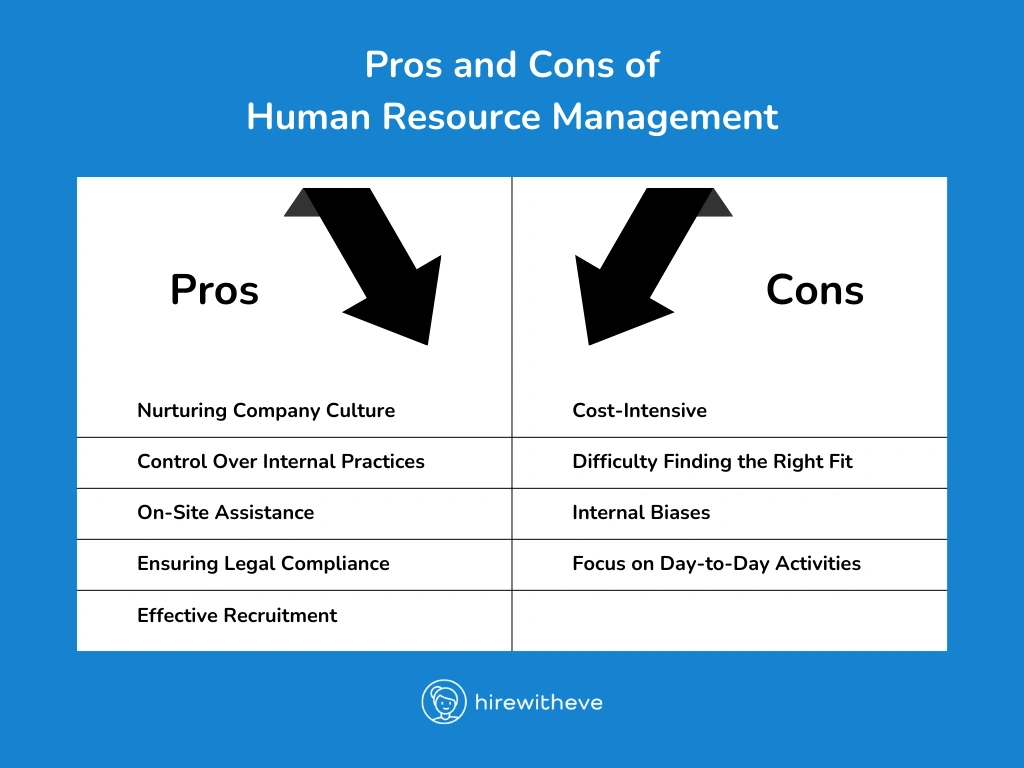Understanding the Pros and Cons of Human Resource Management

Human resource management (HRM) is the backbone of every organization, responsible for hiring, training, and retaining employees who drive business success.
However, HR professionals face numerous challenges, and the keyword risks in human resource management play a critical role in addressing these challenges. From legal issues to talent shortages, HR teams must navigate a complex landscape of potential pitfalls.
This blog will explore the various risks in human resource management and provide actionable insights for talent acquisition specialists and HR managers to mitigate these risks effectively.
What is HR, and What Do They Do?
Human resource management refers to the formal system within organizations that is designed to manage people. HR managers and specialists are tasked with recruitment, performance management, employee development, and ensuring compliance with labor laws and company policies.
As HR professionals take on these responsibilities, they act as a bridge between the company’s strategic goals and employee well-being.
HR departments ensure that organizations are equipped with the right talent while aligning workforce initiatives with business strategies. This includes everything from building a talent pool to nurturing existing employees through continuous learning and development.
At the heart of HRM lies the ability to attract and retain the best talent. Platforms like HirewithEve.ai are making it easier for HR managers to streamline this process. The platform’s skills-based hiring feature helps HR teams focus on competencies rather than resumes, ensuring a more efficient and targeted approach to recruitment.
Now, let’s take a deeper dive into the pros and cons of human resource management to understand both its benefits and challenges.
Pros and Cons of Human Resource Management
Human resource management (HRM) brings several advantages to organizations, especially in areas like compliance, team dynamics, and recruitment. However, there are also challenges that HR professionals must address.
Here is a detailed overview of the pros and cons of human resource management:

The Pros of Human Resource Management
Nurturing Company Culture
One of the most significant pros of human resource management is its role in fostering and maintaining organizational culture. An in-house HR department has a deep understanding of the company’s values, and they work to cultivate a positive work environment by engaging in team discussions and organizing events. This nurtures a strong culture aligned with the company’s goals.
Control Over Internal Practices
Having an internal HR team provides businesses with greater control over their internal processes. The team ensures that policies are enforced and that employee management aligns with the company’s mission. This level of control helps businesses maintain confidential information and monitor employee productivity effectively.
On-Site Assistance
HR professionals who are part of the internal staff offer reliable, on-site assistance. They can address issues quickly because they understand the nuances of the company and its workforce. This immediacy allows for faster resolution of conflicts and helps maintain the company’s momentum.
Ensuring Legal Compliance
One of the major pros of human resource management is ensuring that companies comply with ever-evolving labor laws and regulations. By staying on top of these legal requirements, HR teams help avoid costly fines and lawsuits, providing a safer and more compliant work environment.
Effective Recruitment
Internal HR departments are well-equipped to recruit employees who fit both the skills and culture of the organization. They have a deep understanding of the company’s needs and can strategically onboard employees who are likely to contribute to long-term success.
The Cons of Human Resource Management
Cost-Intensive
One of the key cons of human resource management is the cost associated with maintaining an in-house team. HR departments are expensive to run, especially in smaller companies, as they require full-time staff, training, and resources. Salaries for experienced HR managers can also be quite high, and some companies may find it more cost-effective to outsource these functions.
Difficulty Finding the Right Fit
Recruiting the right HR professional is itself a challenge. If an organization cannot find the right person for the role, it may suffer from inefficient HR operations. The risk is that a poorly structured HR department will struggle to deliver results, potentially causing organizational issues.
Internal Biases
Another con of having an in-house HR team is the potential for internal bias. Because HR professionals work closely with employees and management, they may have difficulty remaining impartial in disputes or decisions. Over time, personal relationships could interfere with their objectivity, negatively impacting the organization’s fairness and transparency.
Focus on Day-to-Day Activities
HR departments can sometimes be so consumed with day-to-day operational tasks that they fail to engage in long-term strategic planning. This could limit the organization’s ability to develop innovative HR practices or stay current with industry trends.
These insights demonstrate both the benefits and challenges associated with human resource management, helping HR professionals and businesses make informed decisions about structuring their HR departments.
Conclusion
Human resource management is a multifaceted function within organizations, offering both significant benefits and notable challenges. By examining the pros and cons of human resource management, HR professionals can better understand how to enhance their strategies and ensure alignment with the company’s goals.
Platforms like HirewithEve.ai can help HR teams address some of the common challenges, such as bias in recruitment and inefficiencies in the hiring process, by offering tools that focus on skills-based assessments and candidate performance.
Understanding the pros and cons of human resource management allows HR managers and talent acquisition specialists to create more robust, fair, and effective HR policies.
As the workforce continues to evolve, embracing both the benefits and challenges of HR will be key to navigating this complex and ever-changing landscape.
